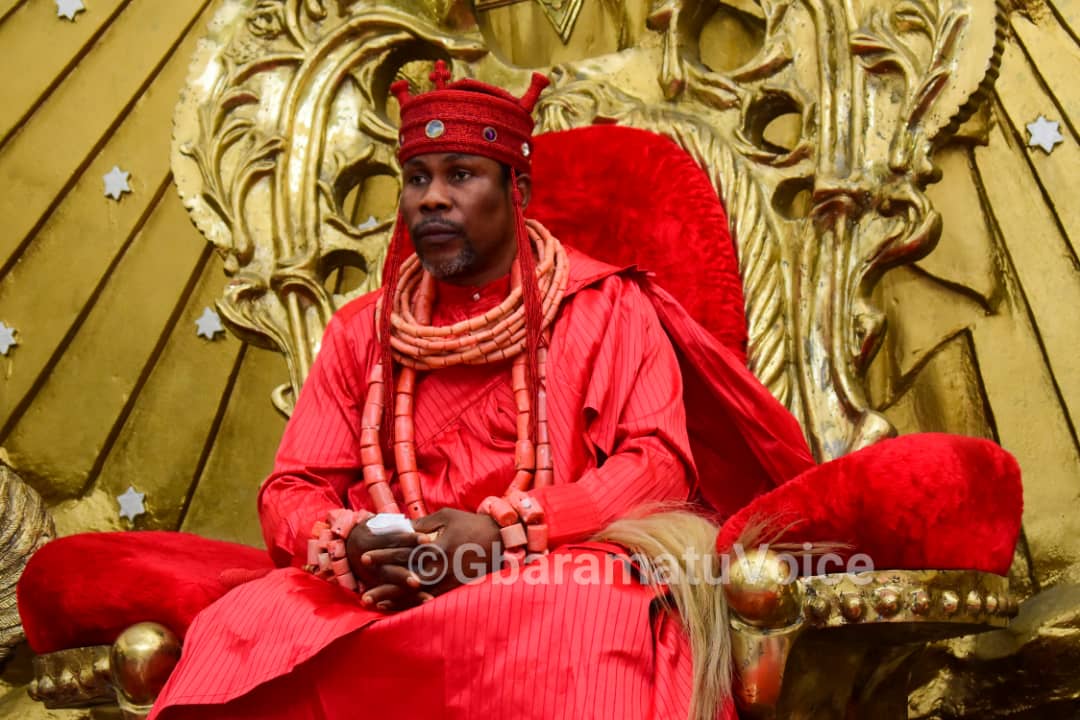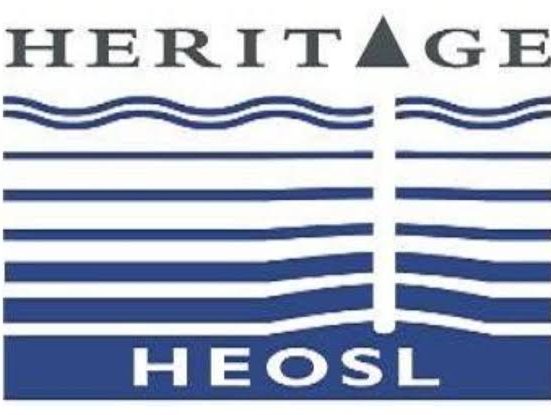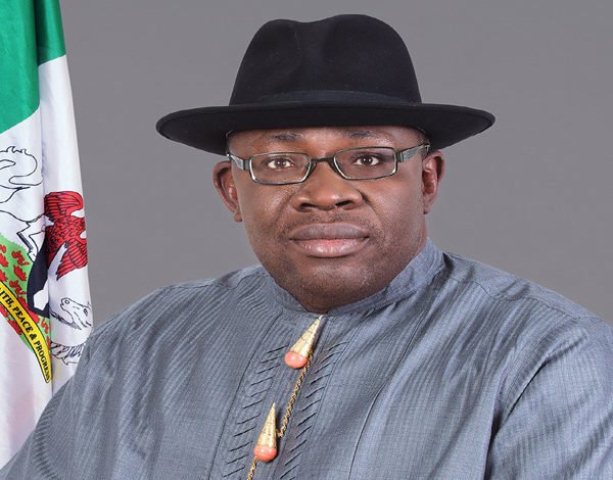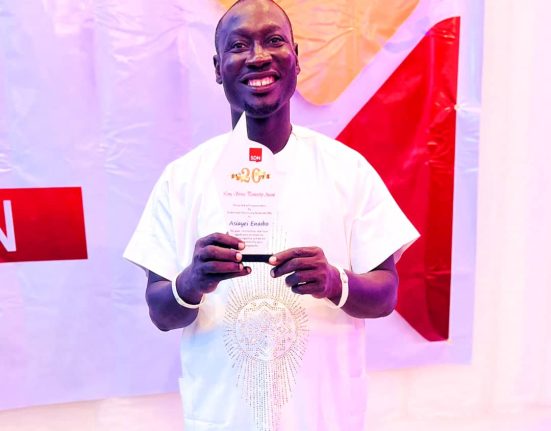BEING A SPEECH PRESENTED BY HIS ROYAL MAJESTY OBORO GBARAUN II, AKETEKPE AGADAGBA, THE PERE OF GBARAMATU KINGDOM TO THE CEO/GROUP MANAGING DIRECTOR (GMD) OF THE NIGERIAN NATIONAL PETROLEUM CORPORATION (NNPC) LIMITED, ON THE OCCASION OF HIS WORKING VISIT TO GBARAMATU KINGDOM, DELTA STATE, AT OPOROZA COMMUNITY, THE TRADITIONAL HEADQUARTERS OF GBARAMATU KINGDOM, ON OCTOBER 14, 2021.
(READ BY THE FIYEWEI OF GBARAMATU KINGDOM, HIGH CHIEF GODSPOWER GBENEKAMA JP)
The Group Managing Director of the NNPC, and members of his entourage,
Representative of Government Parastatals,
His Royal Majesties
Respected Chiefs, Elders and Community leaders,
Members of the Press,
Distinguish Ladies and gentlemen.
We are elated to receive you today in the oil rich Gbaramatu Kingdom as this visit is long overdue with regards to the significant contribution of Gbaramatu Kingdom to the oil and gas industry and to national social, political and economic well being of Nigeria. More so, we are also particular pleased to have you because this visit will further afford you the opportunity to have the practical feel of the impacts of crude oil exploration and exploitative activities on the grass root communities of the coastal belt of Niger Delta at large and Gbaramatu Kingdom in particular. This visit will enhance your understanding on the protracted issues we are faced with beyond the doctored reports.
Let me reiterate that Gbaramatu kingdom is friendly, peaceful, accommodative and development-friendly. But efforts of oil multi-nationals in our communities do not reflect our contribution to peace and national development. We therefore enjoin you to enjoy the natural environment spiced with the multifaceted Gbaramatu hospitality, laced with royal blessings, with lengthy network of complex creeks and rivers, strategically positioned by God at the Atlantic Ocean, the Kingdom is filled with various oil and gas resources and host to many oil and gas fields such as Abiteye (Kenyangbene), Egwa I, Egwa II, Odidi I, Odidi II, Jones Creek, Makaraba and several others including offshore fields. Furthermore, Gbaramtu Kingdom remains a critical sea route to vessels going to the various seaports in Delta state and beyond. Most recently, it has become host to the Nigerian Maritime University, Okerenkoko which is first of its kind in the entire West Africa Sub-region but gravely underfunded for perhaps petty political reasons.
It is against the above backdrop, we present the following critical items for your keen consideration and necessary action.
3% FUNDS FOR HOST COMMUNITIES IN PETROLEUM INDUSTRY ACT: GROSSLY INADEQUATE
The passing into law of the long-awaited Petroleum Industry Act is welcome development and commendable due to the fact that it is intended to address the issue of sustainable development which is a local problem in the Niger Delta host communities with global implications. We appreciate his Excellency President Muhammadu Buhari and the National Assembly for this feat.
However, the 3% provided for host communities is grossly inadequate considering the long environmental, health, social and economic devastation foisted on oil-bearing communities from the effect of oil exploration and exploitation in the Niger Delta region since it was discovered in explorable quantity in 1956 at Oloibiri in the current day Bayelsa State.
As the stakeholder in charge of the NNPC who is aware of the huge burden on the United Nation to engender sustainability in local communities to as a matter of moral responsibility and dignity in the practice of participatory negotiation, insist that the oil-bearing communities are not comfortable with the said 3% and in reality, it cannot address these long years of neglect. Therefore, we enjoin that the 3% be improved upon to reflect the 10% demands of the host communities. Having established the above, let us turn to the issues of framework and transparency in the PIA.
The objectives of Chapter 3 of the PIA are laudable but effective implementation to reduce future agitation is a matter of concern. Permit me therefore to make some suggestions for inclusion in the ongoing amendment of the PIA 2021.
Section 235 which gives the oil companies (“settlors”) the power to constitute or incorporate host community’s development Trust does not seat well with necessary stakeholders in the grassroot. We advise that communities be allowed to set up their own Trusts within a specified time frame while allowing oil companies and government nominate their representatives to such Trusts. Denying the oil –bearing communities of this right undermines their rights and defeating the laudable objectives of the law.
Also, the regulations and guidelines referred to in Section 234 and 235 respectively should be published without delay and the Commission and Authority should request for input from seasoned lawyers from the region nominated by the communities for that purpose.
Worse still, the objectives of the community Trust stated in S. 239 cannot be achieved with the current fragmentary framework contained in Chapter 3 of the PIA. What then task interested minds are: How do we enhance security and facilitate economic opportunities without a region or at least state wide approach on issues on security and economic development? If one community demand street lights and another insist on road, how does that foster economic development or security where the road without street light meet the street light without road?
We therefore propose a larger chunk of funds to go to a regional or statewide security; environmental protection and economic development for which the communities can agree by a transparent process on what projects will advance such objectives.
We insist on a transparent process for communities to ascertain the actual annual operating expenditure of an oil company in order for the implementation of the approved 3% to be resentment free. At present, nobody knows what 3% of annually OPEX means in the PIA.
In line with above suggestions, Section 244 of the PIA should be amended to allow 50% of capital funds to go to the regional fund while 50% is retained by the local Trust. 20% reserve fund should be increased to 25% and administrative cost eliminated. Individuals who serve on the various boards should receive no remuneration to make it attractive to public spirited Individuals only.
With respect to the Decommissioning and Abandonment Fund established by Section 233 of the PIA, we believe it is inappropriate to use an Escrow Account system which unfairly benefits the banks rather than the people who are the real intended beneficiaries. That money may sit in a bank for 10 years before it may be utilised. And on whose benefits is that? Obviously, the Banks!
Instead, we propose that the PIA converts the fund upon depose to a low-rise investment fund patterned on the Norwegian Oil Fund which has done so well. That way, more money can be made available to take care of so large a need without burdening the Government or the oil companies and removing the unsolicited benefit from the banking industry to the detriment of our collective development.
We therefore urge you as the man directly managing the oil industry on behalf the Government and of course mediating on its behalf with the oil multi-nationals, to as a matter of utmost importance, justice, dignity and morality, reach out to the National Assembly and the Presidency to affect an upward review of the host communities’ fund to the 10% earlier suggested by the House of Representatives and the oil-bearing communities.
THE GROSS UNDERFUNDING OF NIGERIA MARITIME UNIVERSITY, OKERENKOKO
Funding is the bane of the Nigeria Maritime University, Okerenkoko. The panacea to that problem is the passing to law of its enabling Act.
The maritime industry, with the long natural shoreline of Nigeria and the thousands of navigable and potentially navigable highland waterways in Nigeria, is a gold mine lying waste. Even with the minimal participation of necessary stakeholders in the maritime industry, both national and international waters, Nigeria has no adequate skilled manpower to meet the requirement of the industry. The country relies largely on foreign skilled labour in the maritime industry, thereby losing millions of job opportunities, foreign exchange and investment.
The initiative for the establishment of the Nigerian Maritime University is to fill the huge gab in maritime labour adequacy, by training highly skilled maritime practitioners at international standard.
Unfortunately, that vision is been stunted by the failure of the current administration to take advantage of this initiative by passing to law the enabling Act that will boost the efficiency of the university through well-defined funding channels.
The university, being a specialized one, require specialized maritime experts that are highly sorted for all over the world. Only proper funding that will ensure adequate staff remuneration and well being can retain these professionals to enable the university to produce other professionals.
Therefore, we use this opportunity to call on Mr. President and the National Assembly to urgently pass the enabling Act of the university into law.
THE SHIPBUILDING AND DRY-DOCK YARD APPROVED FOR THE NIGERIA MARITIME UNIVERSITY, OKERENKOKO
In similar breath, we also call on the federal government to relocate and commence the shipbuilding and dry-dock yard approved by the Dr Goodluck Jonathan administration sited in Okerenkoko to support the university and provide practical experience for students and lecturers. Keeping that project moribund by this administration since it came on board for obvious political reason is affecting the quality of products expected to be graduated from the Nigeria Maritime University. More so, that project would also have mobbed up allot of idle youths from the Nigerian street and caused the development of other resultants. We therefore implore the government to revisit this issue with a favourable actions.
INAUGURATION OF SUBSTANTIVE BOARD OF NDDC
The call for the substantive board of the Niger Delta Development Commission—NDDC is a collective outcry by all necessary stakeholders of the region. Undermining this call is as good as undermining the very efforts of concern stakeholder just as the way the continual stay of the sole administration undermines the very Act that establish the board. Thus, we enjoin you to join voices with the grassroot to call for the immediate constitution of the substantive board.
EMPLOYMENT OPPORTUNITIES
It is imperative to let you know that our people especially the youths are not happy with the management of the Nigerian National Petroleum Corporation (NNPC) for the deliberate neglect and deprivation of our teaming youths—skilled and educated in terms of employment opportunities and lack of appointment of our resource persons into key positions in the upstream Petroleum Regulatory Commission (UPRC) and the Nigerian Midstream and Downstream Petroleum Regulatory Authority (NPRA) Board. It for this reason that we enjoin you to create employment channel to the youths of this kingdom and Niger Delta at large for the aim of engendering sustainable progress.
Conclusively, our very distinguished guest, may we not burden you farther considering the already heavy one you bear. However, we do sincerely which that these our request are swiftly presented to the appropriate authorities as we expect swift action in the earliest best convenient time.
We thank you for your time and do wish you and your entourage divine guidance on your way back at the end of this visit.
Long Live the Federal Republic of Nigeria!
Long Live Niger Delta!!
Long Live Delta State!!!
Long Live Gbaramatu Kingdom!!!
Support Quality Journalism in the Niger Delta Region
Join us in our mission to bring development journalism, cultural preservation, and environmental awareness to the forefront. Your contribution makes a difference in the lives of the people of the Niger Delta. Donate today and be a part of the change!








